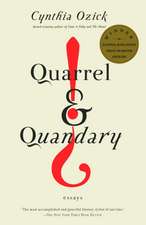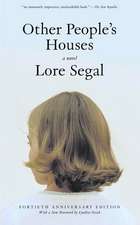Foreign Bodies
Autor Cynthia Ozicken Limba Engleză Paperback – apr 2012
| Toate formatele și edițiile | Preț | Express |
|---|---|---|
| Paperback (2) | 92.44 lei 3-5 săpt. | |
| HarperCollins Publishers – 14 noi 2011 | 92.44 lei 3-5 săpt. | |
| ATLANTIC BOOKS LTD – apr 2012 | 94.36 lei 3-5 săpt. | +10.30 lei 7-11 zile |
Preț: 94.36 lei
Nou
Puncte Express: 142
Preț estimativ în valută:
18.06€ • 19.61$ • 15.17£
18.06€ • 19.61$ • 15.17£
Carte disponibilă
Livrare economică 01-15 aprilie
Livrare express 18-22 martie pentru 20.29 lei
Preluare comenzi: 021 569.72.76
Specificații
ISBN-13: 9781848877368
ISBN-10: 1848877366
Pagini: 272
Dimensiuni: 128 x 198 x 25 mm
Greutate: 0.25 kg
Ediția:Main
Editura: ATLANTIC BOOKS LTD
ISBN-10: 1848877366
Pagini: 272
Dimensiuni: 128 x 198 x 25 mm
Greutate: 0.25 kg
Ediția:Main
Editura: ATLANTIC BOOKS LTD
Recenzii
"Ozick’s heady fiction springs from her deep critical involvement in literature, especially her fascination with Henry James, which emboldened her to lift the plot of his masterpiece, The Ambassadors, and recast it in a taut and flaying novel that is utterly her own….Ozick’s dramatic inquiry into the malignance of betrayal; exile literal and emotional; the many tentacles of anti-Semitism; and the balm and aberrance of artistic obsession is brilliantly nuanced and profoundly disquieting." – Booklist, starred review
From Kirkus
*Starred Review* An extraordinary novel, loosely based on The Ambassadors—but Ozick (Dictation, 2008, etc.) manages to out-James the master himself. Julian Nachtigall, son of a tyrannical and imperious businessman, has gone to Paris but has shown no interest in returning home. While there, he links up with Lili, a Romanian expat about ten years his senior. Marvin, the father, is furious that Julian wants to waste his life playing around in nonserious matters (e.g., writing essays and observations of French life), so he sends his sister Bea (who’s Anglicized her name to Nightingale) to Paris to bring him to his senses as well as bring him home. Bea teaches English to high-school thugs who mock her love of Wordsworth and Keats, and Marvin has always held her in contempt for what in his eyes is her impractical and useless profession. Bea is complicit in tricking Marvin by sending Julian’s sister, Iris, to Paris instead. Iris is the apple of Marvin’s eye, a graduate student in chemistry and a promising scientist—in other words, all that Julian is not. But unbeknownst to Marvin, Iris is also happy to escape the imperatives of her authoritarian and oppressive father, so she goes to Paris more in the belief that she will stay there rather than bring her brother back home to California. Through flashbacks we learn of Bea’s unhappy and brief marriage to Leo Coopersmith, a composer who has pretensions of being the next Mahler, though he winds up something of a Hollywood hack, composing music for cartoons. We also meet Marvin’s long-suffering and brow-beaten wife, Margaret, whose neurasthenia is directly attributable to her husband’s iron-fisted despotism. Ozick brilliantly weaves together the multiple strands of her narrative through letters, flashbacks and Jamesian observations of social behavior. This is superb, dazzling fiction. Ozick richly observes and lovingly crafts each character, and every sentence is a tribute to her masterful command of language.
"Cynthia Ozick is one of America’s greatest living writers... The "leaving" — of parents, of a spouse, of a child, of a family, of a country, of a continent, of all we thought our lives were for — follows every character through this brilliant story of how we mark others without knowing it, revealing how we are all tattooed by other people’s ambitions." - - Dara Horn, The Forward "It is pure pleasure to encounter Cynthia Ozick: a morally brilliant comic master whose plots keep the pages turning and whose every sentence sings. Ozick's latest novel is billed as a 'photographic negative' of Henry James' The Ambassadors, with the same plot and the opposite meaning. Readers put off by James' baroque style have nothing to fear; part of Ozick's inversion of James is the crisp bite of her prose, and the story, ultimately, is fully hers." - Ms. Magazine "...her vision of Europe and its tragic history is profound; and Lili is a creation of stunning depth. It is not Jamesian, it is Ozickian." -- Richard Eder, Boston Globe "Ozick has achieved another success. Henry James -- the master -- would not be displeased." -- Miami Herald
"This is vintage Ozick; she is, perhaps, our most c —
From Kirkus
*Starred Review* An extraordinary novel, loosely based on The Ambassadors—but Ozick (Dictation, 2008, etc.) manages to out-James the master himself. Julian Nachtigall, son of a tyrannical and imperious businessman, has gone to Paris but has shown no interest in returning home. While there, he links up with Lili, a Romanian expat about ten years his senior. Marvin, the father, is furious that Julian wants to waste his life playing around in nonserious matters (e.g., writing essays and observations of French life), so he sends his sister Bea (who’s Anglicized her name to Nightingale) to Paris to bring him to his senses as well as bring him home. Bea teaches English to high-school thugs who mock her love of Wordsworth and Keats, and Marvin has always held her in contempt for what in his eyes is her impractical and useless profession. Bea is complicit in tricking Marvin by sending Julian’s sister, Iris, to Paris instead. Iris is the apple of Marvin’s eye, a graduate student in chemistry and a promising scientist—in other words, all that Julian is not. But unbeknownst to Marvin, Iris is also happy to escape the imperatives of her authoritarian and oppressive father, so she goes to Paris more in the belief that she will stay there rather than bring her brother back home to California. Through flashbacks we learn of Bea’s unhappy and brief marriage to Leo Coopersmith, a composer who has pretensions of being the next Mahler, though he winds up something of a Hollywood hack, composing music for cartoons. We also meet Marvin’s long-suffering and brow-beaten wife, Margaret, whose neurasthenia is directly attributable to her husband’s iron-fisted despotism. Ozick brilliantly weaves together the multiple strands of her narrative through letters, flashbacks and Jamesian observations of social behavior. This is superb, dazzling fiction. Ozick richly observes and lovingly crafts each character, and every sentence is a tribute to her masterful command of language.
"Cynthia Ozick is one of America’s greatest living writers... The "leaving" — of parents, of a spouse, of a child, of a family, of a country, of a continent, of all we thought our lives were for — follows every character through this brilliant story of how we mark others without knowing it, revealing how we are all tattooed by other people’s ambitions." - - Dara Horn, The Forward "It is pure pleasure to encounter Cynthia Ozick: a morally brilliant comic master whose plots keep the pages turning and whose every sentence sings. Ozick's latest novel is billed as a 'photographic negative' of Henry James' The Ambassadors, with the same plot and the opposite meaning. Readers put off by James' baroque style have nothing to fear; part of Ozick's inversion of James is the crisp bite of her prose, and the story, ultimately, is fully hers." - Ms. Magazine "...her vision of Europe and its tragic history is profound; and Lili is a creation of stunning depth. It is not Jamesian, it is Ozickian." -- Richard Eder, Boston Globe "Ozick has achieved another success. Henry James -- the master -- would not be displeased." -- Miami Herald
"This is vintage Ozick; she is, perhaps, our most c —
Notă biografică
Author of numerous acclaimed works of fiction and nonfiction, CYNTHIA OZICK is a recipient of the National Book Critics Circle Award and was a finalist for the Pulitzer Prize, the National Book Award, and the Man Booker International Prize. Her writing has appeared in The New Republic, Harper's, and elsewhere. She lives in New York.












